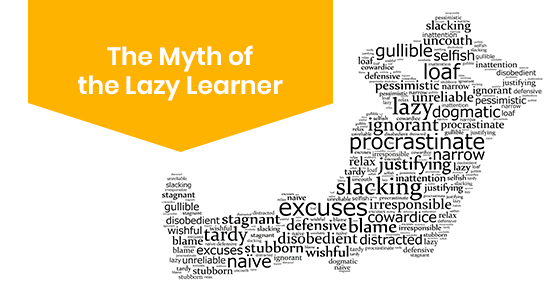Students with reading deficits could tell you a lot about the Greek myth of Sisyphus, the king of Ephyra who was punished by the gods by being forced to push a large boulder up a hill every day, only to have it roll back every time he reached the top.
That’s how it feels to students who try to decode unfamiliar words whenever they are reading. It’s laborious, futile, and they have to do it alone. No one understand how heavy the burden really is, and it makes them anxious, frustrated, and angry.
There is a lack of understanding about the extraordinary demand that an inability to decode words places on a student’s short-term and working memory, and how laborious non-proficient reading approaches are for the brain.
Learned Helplessness
If you had to move a boulder unsuccessfully up a hill every day, you might stop showing up for work. You would definitely avoid leaving your house if you knew you had to do it. You would probably lie about whether you had already made the effort or makeup stories about why you couldn’t quite make it to the base of the hill. You would feel ashamed and rather stupid if everyone else could move that boulder to the top and get it to stay there, but for some reason you couldn’t get it all the way up there, no matter how hard you pushed it or how many times you tried.
Eventually you would accept the fact that no matter how much effort you made you weren’t going to be successful. You would tell yourself that you just weren’t any good at completing the task. You would give up trying and succumb to a learned helplessness. But what if there was a strategy for getting that rock to the top and having it stay there?Something that all of your friends were using but that no one had shared with you. It’s not natural to be able to push a huge boulder to the very top of a hill, but there are approaches and tools that can make it easier.
Falling Behind
Just like the task that is never finished, reading without decoding is taxing, laborious, frustrating, unsatisfying; overloads short-term memory; and impedes comprehension. Struggling readers lose ground not only in decoding, but in automaticity, fluency, vocabulary growth, and comprehension. They fall behind their classmates, and without direct instruction and intensive intervention, are never able to catch up.
By high school, many students with decoding challenges are lagging behind their peers by as much as four years. They become anxious about school, demotivated, and lack self-confidence in their ability to read. Many students give up trying to improve reading altogether, believing that it is hopeless to try. Two variables impact motivation: whether we expect to be successful at a task and how much value we place on that success (Wigfield& Asher, 1984). People generally believe they are successful because of one of three reasons: ability, effort, or luck. Clearly, the consequences of reading failure stretch far beyond academic outcomes.
Making It to the Top
Reading research tells us that even older poor readers can learn to read with appropriate instruction. Learning to decode helps students push that boulder to the top of the hill, opening the door to achievement and allowing sound-symbol associations, automatic word recognition, fluency, and comprehension to occur.
Students who can’t find a way to get to the top of the hill will continue to struggle, and the older we get, the harder the task will be.
Evoke Learning can help. We offer reading remediation programs with intensive, personalized intervention for students in Grades 1–12. Contact us to learn more about how our services can accelerate progress for struggling readers.



